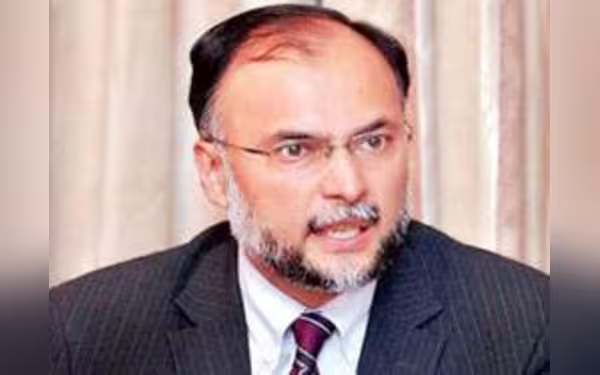Wednesday, December 4, 2024 08:08 AM
Ahsan Iqbal Advocates Education Reforms in Pakistan
- Ahsan Iqbal emphasizes critical thinking in education.
- Need for globally accredited teacher training programs.
- Focus on teamwork and collaboration in learning.
 Image Credits: nation_pk
Image Credits: nation_pkAhsan Iqbal calls for critical thinking and teamwork in Pakistan's education reforms, emphasizing the need for globally accredited training programs.
In recent years, the education system in Pakistan has faced numerous challenges, prompting calls for urgent reforms. The need for a robust educational framework that prepares the youth for the complexities of the modern world has never been more critical. Federal Minister for Planning, Development, and Special Initiatives, Ahsan Iqbal, has taken a strong stance on this issue, advocating for significant changes to align the country's educational practices with global standards.
During a progress review meeting at the Teacher Training Institute, Ahsan Iqbal highlighted the pressing need for globally accredited training programs. He pointed out that the current education system is not adequately preparing students for the challenges they will face in the 21st century. The meeting brought together senior officials from the Ministry of Federal Education, as well as representatives from the Planning and Education Ministries, to discuss the way forward.
One of the key points raised by the Minister was the importance of reviving foundational ethics and fostering a global perspective among the youth. He stated, “Our education system must focus on building team dynamics, fostering collaboration, and achieving collective successes.” This statement underscores the need for a shift in educational philosophy, where teamwork and critical thinking are prioritized.
Moreover, Ahsan Iqbal emphasized the evolving role of teachers, describing them as knowledge managers responsible for nurturing future leaders. He noted that approximately 1.8 million teachers in Pakistan require training to meet modern educational challenges. Additionally, with a demand for 1 million new teachers to cater to the growing population, the Minister reiterated the necessity of implementing globally recognized training programs.
To address these challenges, proposed solutions included adopting best practices from successful education systems in countries like Finland, Singapore, Australia, and Vietnam. These countries have demonstrated effective integration of theory with practice, adaptability, and a clear link between accreditation and career progression. Iqbal also stressed the need for mandatory certifications for headmasters and headmistresses to ensure they possess the necessary leadership skills.
The meeting concluded with a roadmap aimed at achieving international recognition for Pakistan's education system. This includes forming partnerships, developing a comprehensive curriculum, and establishing global benchmarks for teacher accreditation and essential 21st-century skills in public schools.
The call for education reforms in Pakistan is not just about improving academic standards; it is about preparing the youth for a future filled with opportunities and challenges. By focusing on critical thinking, teamwork, and globally recognized training, Pakistan can pave the way for a brighter future for its students. The journey may be long, but with the right strategies and commitment, the nation can transform its education system into one that truly empowers its youth.













